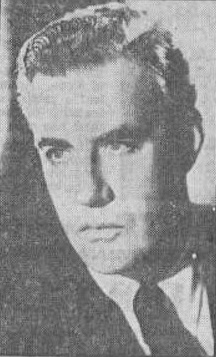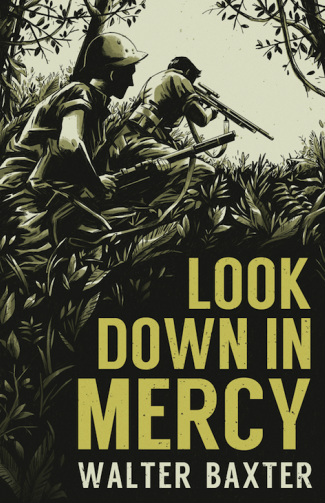|
BOOK DETAILS
Trade paper ISBN-13: 978-1941147009 List Price: $19.99 U.S. Pages: 290 Published: 2014 |
Look Down in Mercy (1951)
Walter Baxter With a new introduction by Gregory Woods Book Description
One of the finest British novels to come out of World War II, Look Down in Mercy is the story of the moral disintegration of an ordinary British Army officer when faced with the unspeakable horrors of war. Newly arrived in Burma and waiting for the fighting to start, the outwardly brave and rugged Capt. Tony Kent passes the interminable and swelteringly hot days in bouts of heavy drinking and casual sex. But when the campaign begins in earnest, Kent is forced to confront his own inner darkness as his cowardice and fear lead to treason and cold-blooded murder. Surrounded by brutality and death on all sides, Kent’s sole source of comfort is his love for his batman, Anson. But in the face of nearly insurmountable obstacles—enemy artillery, legal and social condemnation, and Kent’s own doubts and self-loathing—can their love possibly survive? Look Down in Mercy (1951) was both a bestseller and a major critical success for its author, Walter Baxter (1915-1994), whose second novel, The Image and the Search (1953), landed him in court on criminal obscenity charges and ended his writing career. This edition, the first in more than four decades, features a new introduction by Gregory Woods and includes both the original ending and the alternate ending from the 1952 American edition. |
reviews
“In this remarkable first novel Mr. Baxter does a great deal more than show promise; if there is any justice in the world he has arrived.” – Times Literary Supplement
“A first novel of more than promise. It is a distinct achievement.” – Joseph Taggart, Star
“An uncommonly good novel.” – Time Magazine
“A first novel of great promise . . . penetrating insight of a man’s struggle against the dark powers of moral disintegration.” – News Chronicle
“A brilliantly good novel.” – Lionel Hale, Observer
“Automatically rises to a high level of interest by facing up to problems which have been considered taboo in numerous other war novels by writers on both sides of the Atlantic . . . Mr. Baxter displays a rousing knack for good story-telling with lean, unfrilled prose.” – Saturday Review
“[M]ay well be considered one of the finest pieces of descriptive writing to come out of the war. . . . This is an outstanding novel. The writing is very, very good. Highly recommended.” – Birmingham News
“[O]ne of the best of its kind ever written . . . quite literally an unforgettable experience.” – Savannah News
“A first novel of more than promise. It is a distinct achievement.” – Joseph Taggart, Star
“An uncommonly good novel.” – Time Magazine
“A first novel of great promise . . . penetrating insight of a man’s struggle against the dark powers of moral disintegration.” – News Chronicle
“A brilliantly good novel.” – Lionel Hale, Observer
“Automatically rises to a high level of interest by facing up to problems which have been considered taboo in numerous other war novels by writers on both sides of the Atlantic . . . Mr. Baxter displays a rousing knack for good story-telling with lean, unfrilled prose.” – Saturday Review
“[M]ay well be considered one of the finest pieces of descriptive writing to come out of the war. . . . This is an outstanding novel. The writing is very, very good. Highly recommended.” – Birmingham News
“[O]ne of the best of its kind ever written . . . quite literally an unforgettable experience.” – Savannah News
ALSO AVAILABLE THROUGH ONLINE RETAILERS
|
EBOOK
Kindle US |
AUTHOR BIOGRAPHY

Walter Baxter was born in 1915. During World War II, he was a commander in the British Army and served in Burma, taking part in the fighting retreat when the Japanese invaded. Later, he served as aide-de-camp to General Slim of the 14th Army; his wartime experiences would provide the basis for Look Down in Mercy (1951).
Returning to London after the war, he worked briefly in his family’s business before deciding in 1949 to pursue a career in writing. Around the same time, he converted to Catholicism and volunteered as a missionary with the Jesuits at a jungle mission station in India.
Baxter’s first novel, Look Down in Mercy, was published to widespread acclaim in both the United Kingdom and the United States, and he was immediately hailed as a young writer of immense talent and promise. His next novel, The Image and the Search (1953), was more controversial and landed both Baxter and his publisher, the firm of William Heinemann, in court on criminal obscenity charges. After two trials, Baxter was acquitted, but, disheartened by his ordeal, he never wrote another book.
Christopher Isherwood records in a diary entry for 1961 that Baxter had “become a rather tragic self-pitying drunken figure with a philosophy of failure,” but nonetheless Baxter enjoyed great success as a restaurateur, owning a French restaurant, the Chanterelle, in South Kensington, which was very highly regarded. In 1962, Baxter met the chef Fergus Provan and the two would become companions for the rest of Baxter’s life; Provan would also take over the running of the Chanterelle after Baxter’s retirement. Walter Baxter died in 1994.
Returning to London after the war, he worked briefly in his family’s business before deciding in 1949 to pursue a career in writing. Around the same time, he converted to Catholicism and volunteered as a missionary with the Jesuits at a jungle mission station in India.
Baxter’s first novel, Look Down in Mercy, was published to widespread acclaim in both the United Kingdom and the United States, and he was immediately hailed as a young writer of immense talent and promise. His next novel, The Image and the Search (1953), was more controversial and landed both Baxter and his publisher, the firm of William Heinemann, in court on criminal obscenity charges. After two trials, Baxter was acquitted, but, disheartened by his ordeal, he never wrote another book.
Christopher Isherwood records in a diary entry for 1961 that Baxter had “become a rather tragic self-pitying drunken figure with a philosophy of failure,” but nonetheless Baxter enjoyed great success as a restaurateur, owning a French restaurant, the Chanterelle, in South Kensington, which was very highly regarded. In 1962, Baxter met the chef Fergus Provan and the two would become companions for the rest of Baxter’s life; Provan would also take over the running of the Chanterelle after Baxter’s retirement. Walter Baxter died in 1994.

